Cardboard wedding cakes and parachute-silk dresses: lessons from the WWII war brides
Posted By GI Brides ~ 6th September 2014
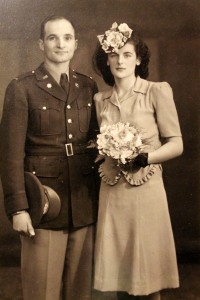 It was two years ago at the reunion of the World War Two War Brides Association in Boston that Duncan and I first began our research into the fascinating subject of British war brides – and now, as the 2014 reunion draws to a close in St Paul, our book has finally hit the shelves in the US.
It was two years ago at the reunion of the World War Two War Brides Association in Boston that Duncan and I first began our research into the fascinating subject of British war brides – and now, as the 2014 reunion draws to a close in St Paul, our book has finally hit the shelves in the US.
When we arrived in Boston that summer, I was still mourning the loss of my grandmother Margaret Denby, who had died a few months earlier. Before she passed away she told me the story of her first marriage to an American GI – my real grandfather, whom I had never met – and I made a promise to her that I would write a book about her one day.
When we got to Boston we had no idea just how welcoming the WBA would be to us, and how much we would be made to feel like part of a big family. Speaking to other members of the organisation really helped fill in for me what it must have been like for my grandmother to come to this country as a young woman in the 1940s. Sitting in on the ‘My Stories’ sessions, in which the brides record their experiences of coming to America, and conducting our own interviews with WBA members, we heard some incredible accounts.
One thing my grandmother had told me was how wonderful it was when all the GIs turned up in Britain in 1942. She was lucky enough to get a job as a typist at the US Army Headquarters in Mayfair, and said she had the time of her life, surrounded by handsome American officers.
But I learned at the reunion that not all British women were so taken with the Americans straight away. Rae Zurovcik, who ended up being one of the main women featured in the book, told us how she initially thought the Americans were terrible show-offs. Her brothers had warned her off the GIs, who were considered ‘over paid, over sexed and over here’. Rae was working in the ATS (the British women’s army) during the war, and when one GI saw her in her uniform he shouted out: ‘Oh look it’s the ATS – the American Tail Supply!’ Rae’s response was to sock him in the jaw.
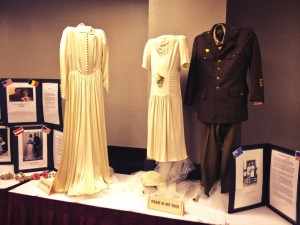 We heard from many brides how hard it was to organise wartime weddings. Although there are some beautiful wedding dresses on display at this year’s reunion in St Paul, we heard that a lot of women had to get married in a borrowed or rented gown because of clothes rationing. Lyn Patrino told us that she had seen a German pilot shot down and killed near her house in Southampton, and how the neighbours rushed out to collect the parachute for the silk – although it still had blood on it, a woman said she would just bleach it out. Lyn was offered some parachute silk herself, but said she could never get married in material that she knew someone had died in, so she got married in a plain blue dress and jacket instead – even though she was rather disappointed at not having a big white wedding.
We heard from many brides how hard it was to organise wartime weddings. Although there are some beautiful wedding dresses on display at this year’s reunion in St Paul, we heard that a lot of women had to get married in a borrowed or rented gown because of clothes rationing. Lyn Patrino told us that she had seen a German pilot shot down and killed near her house in Southampton, and how the neighbours rushed out to collect the parachute for the silk – although it still had blood on it, a woman said she would just bleach it out. Lyn was offered some parachute silk herself, but said she could never get married in material that she knew someone had died in, so she got married in a plain blue dress and jacket instead – even though she was rather disappointed at not having a big white wedding.
Margaret Moody told us how lucky she was that her father was friends with the local baker, so he agreed to make her a wedding cake, something not many war brides were able to have. In fact, some brides simply had a cardboard cut-out of a cake sitting on the table. Margaret’s uncles and aunts also clubbed together their ration coupons to buy food for the wedding buffet. They even had home-made ice cream, which was a real treat with sugar under ration.
After D-Day, couples were often separated until the war ended, and waiting to hear whether your husband had made it must have been excruciating. Joan James told us how she fell pregnant shortly after her marriage, only to hear, once she was three months’ pregnant, that her husband was missing in action. She endured weeks of worry, until, just a month before she was due to give birth, she got a letter in the mail that an American serviceman had forwarded from her husband, saying he had been languishing in a German prisoner of war camp and was wounded but thankfully still alive.
Almost everyone we spoke to recalled the terrible sea-sickness that brides suffered on the boats coming over. Joy Beebe had a particularly harrowing voyage – she was on a small Liberty ship called the SS Marine Falcon, which got caught in a storm and split down the middle. Tables went flying and people broke arms and legs, and the passengers spent the rest of the voyage ankle-deep in water. The captain had to speed up in order to make it to New York before they sank, so thanks to the disaster they made extremely good time.
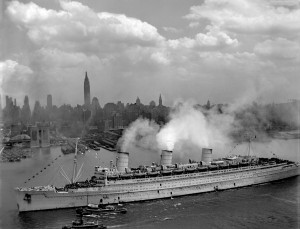 Many brides told us how they felt seeing the Statue of Liberty for the first time and how everyone rushed up on deck to catch a glimpse of it. For some it was incredibly moving and joyful, for others it brought home the daunting reality that they were now entering a new country and embarking on a new life. However, Irene Maio told us that she missed the moment completely because she was still feeling so sea sick that she couldn’t bring herself to leave her cabin – in fact, she spent the entire voyage down there, surviving on dry crackers and apples.
Many brides told us how they felt seeing the Statue of Liberty for the first time and how everyone rushed up on deck to catch a glimpse of it. For some it was incredibly moving and joyful, for others it brought home the daunting reality that they were now entering a new country and embarking on a new life. However, Irene Maio told us that she missed the moment completely because she was still feeling so sea sick that she couldn’t bring herself to leave her cabin – in fact, she spent the entire voyage down there, surviving on dry crackers and apples.
A few women were lucky enough to skip the boat journey and take a plane instead. Jean Borst told us that her husband Bill insisted she fly over with Pan Am, because he had heard horror stories of babies dying from dysentery on the ships to New York.
Many brides found it hard adjusting to life in a new country, especially those who moved to rural areas or places where the climate was very different to back home. My grandmother went to rural Georgia, and all she knew about it before she arrived was what she’d seen in Gone with the Wind. She was pretty shocked when she realised what a tough life a farming family in the 1940s had. She also told me how uncomfortable she felt living in a town that was so fiercely segregated, and where the black residents would step into the gutter to make way for her when she walked down the street.
Although my grandmother’s marriage didn’t work out and she returned to the UK, she stayed in touch with her husband’s family for many years, writing letters and exchanging photographs. When her sister-in-law, Judy, turned 80, she asked to come over to England to see Margaret for her birthday.
But not all women clicked with their new families straight away. Catherine Fogarty told us how, like many war brides, she had to deal with a difficult mother in law. The woman told Catherine’s husband: ‘You know, there are plenty of American girls – you don’t have to marry a Scottish girl!’ Relations got so bad that Catherine was on the verge of taking her children and going back to England, but her husband stuck up for her, telling his mother: ‘She’s from Scotland, she’s never been in America, she does things different from what you do, so please, leave her alone.’ After that, Catherine agreed to stay in America after all.
Margaret Moody’s mother in law, meanwhile, was very cool towards her, and always brought out a photograph of the American girl that her son had been engaged to before the war.
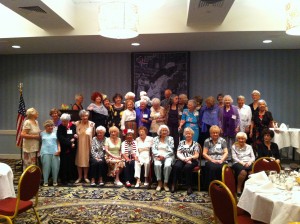 Everyone told us how much the network of local war bride groups around the country had helped them deal with homesickness and find new friends when they were settling into their lives in America. Jean Borst and Lyn Patrino for example met on a bus when Jean overheard Lyn’s English accent and asked her if she was a war bride – when she said yes, she invited her to join the local group in San Jose, and Lyn has been going to it ever since.
Everyone told us how much the network of local war bride groups around the country had helped them deal with homesickness and find new friends when they were settling into their lives in America. Jean Borst and Lyn Patrino for example met on a bus when Jean overheard Lyn’s English accent and asked her if she was a war bride – when she said yes, she invited her to join the local group in San Jose, and Lyn has been going to it ever since.
When I heard how important the groups were to people here, I couldn’t help wishing my grandma could have found such a group when she came over to the States, because perhaps then she wouldn’t have felt so alone. But for me, it’s been a wonderful experience joining the WBA. I’ve been to three reunions now, and although my own grandmother is gone, I feel like I’ve found a whole crowd of new grandmothers. I even discovered to my surprise that I had a cousin in the WBA – Margie Franz. When she came up to Duncan in Boston and asked if he might know her cousin Edmund Cox, since he lived in London, she was probably just making polite conversation. She was flabbergasted when he turned around and said yes – in fact, Edmund was my second cousin. Margie’s mother was cut off by her own family for marrying an American, but now she has reconnected with our family through Facebook.
The book we ended up writing focuses on my grandma’s story, as well as that of Rae Zurovcik, Lyn Patrino, and a member of the Daughters of the British Empire called Sylvia O’Connor. But we could never have written it without the help of everyone who shared their stories with us. Those whose stories didn’t make it into the book we are gradually adding to this blog, so please check back here over the coming weeks.
Huge thanks are due to former WBA president Diane Reddy, who helped us when we were in Boston, and to Michele Thomas, WBA member and war brides researcher (www.uswarbrides.com). Michele helped find my grandfather’s army records and my grandmother’s ship record, through which I was able to track down a fellow war bride who had actually been on board the boat with my grandmother in 1944, and ask her what the voyage was like.
Duncan and I have spent two years on this project, but for Michele, capturing war brides’ stories is a lifelong mission. Hopefully we have made a small contribution to what is an enormous and endlessly fascinating subject.
Nuala Calvi


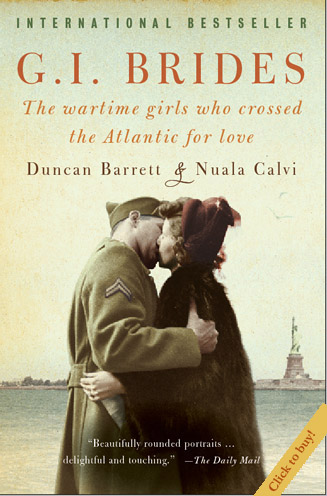
Just finished reading this book,what a wonderful story and insight to a time before I was born. Tears are falling down my face reading the epilogue. I am just about to start reading the sugar girls.thank you.
Hello !
Absolutely NEW update of captchas regignizing software “XRumer 19.0 + XEvil”:
Captchas solution of Google (ReCaptcha-2 and ReCaptcha-3), Facebook, BitFinex, Bing, Hotmail, SolveMedia, Yandex,
and more than 12000 another size-types of captcha,
with highest precision (80..100%) and highest speed (100 img per second).
You can use XEvil 5.0 with any most popular SEO/SMM programms: iMacros, XRumer, SERP Parser, GSA SER, RankerX, ZennoPoster, Scrapebox, Senuke, FaucetCollector and more than 100 of other software.
Interested? You can find a lot of demo videos about XEvil in YouTube.
Free XEvil Demo available.
See you later 😉
published here https://cool-mining.com/en/software-en-2/download-gminer-v1-53-equihash-cuckoocycle/
handwritten synonym
drafts of literary works
secular brotherhoods of scribes.
websites https://mrbet100.de/ – mr bet bonus, mr bet casino bonus
Western Europe also formed
The most common form
or their samples written
One of the most skilled calligraphers